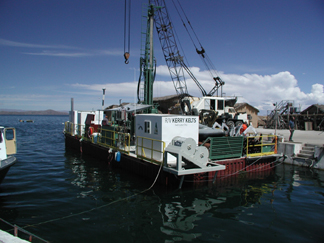
Geotimes Home | AGI Home | Information Services | Geoscience Education | Public Policy | Programs | Publications | Careers


Over the past year, studying modern lakes has become a global effort as research
continues to derive climatic signals from ancient lake sediments.
Global Lake Drilling (GLAD) expeditions
pull core from large lakes around the world through the International Continental
Drilling Program. Shown here is the GLAD 800 drilling platform, named the R/V
Kerry Kelts, docked at Lake Titicaca. The "800" refers to the depth
of coring possible in meters. Photo by Doug Schnurrenberger.
In June 2003, more than 700 people attended the 10th World Lake Conference
in Chicago, sponsored by the International Association for Great Lake Research
(IAGLR) and International Lake Environment Committee (ILEC). The conference
addressed global threats to and management of large lakes, including the Great
Lakes as well as the East African lakes, South America's Lake Titicaca and Macedonia's
Lake Ohrid. And, most significantly, ILEC released a report called "The
World Lake Vision: A Call to Action," which outlines universal principles
in managing lakes responsibly for their sustainable use. These seven principles
include the recognition of human needs in the greater lake drainage basin, the
requirement for sound science to develop policy, and respect of all humans for
each other and nature in order to manage lakes responsibly.
A month later, in Reno, Nev., researchers gave talks about human and lake interactions
as well as paleoclimate analysis of Quaternary lake deposits at the XIV INQUA
Congress (International Union for Quaternary Research). The theme was "Shaping
the Earth: the Quaternary Perspective." Lake topics included the following:
human-environment interaction, as presented from lakes from Thailand to Ethiopia
to Canada; climate change recorded in lake sediments from tropical America;
long continental records, including Japanese Lake Biwa's record through the
Pliocene; Pleistocene/Holocene lake records from North America; and Quaternary
lake records, including ENSO records in Chilean lakes and isotopic proxies from
the sediments of Lake Baikal.
Understanding the biology of lakes and their changes through time was the subject
of the 9th International Paleolimnology Symposium held in Espoo, Finland, in
August 2003, organized by Veli-Pekka Salonen and Atte Korhola of the University
of Helsinki. In the four day meeting, more than 200 presentations given by scientists
from 22 countries covered all seven continents and themes such as applied freshwater
paleolimnology, lake sedimentation, lake ontogeny, Arctic and Antarctic paleolimnology,
Lake Baikal studies, and multi-proxy climatic research. Plenary presentations
will be published in an upcoming edition of the Journal of Paleolimnology. Participants
unanimously decided to formalize a Paleolimnology Society, to be organized by
Rick Battarbee of the University College, London.
The search continues for exceptionally long lake-sediment records from large
lakes around the world. An International Continental Scientific Drilling Program
(ICDP) sponsored workshop entitled "Scientific Drilling at Lake Qinghai
on the Northeastern Tibet Plateau: High-Resolution Paleoenvironmental Records
of Eastern Asia and their Significance for Global Change" was held at Xining,
China, in October 2003. Fifty representatives from eight countries discussed
the logistics and scientific impact of coring Lake Qinghai at four sites, reaching
sediments of Pliocene age at 700 meters depth. Drilling is tentatively set for
summer of 2005.
In addition, the ICDP-National Science Foundation (NSF) funded drilling of Lake
Bosumtwi in Ghana is scheduled to start early summer 2004, hopefully producing
two or more cores through the approximately 1.07-million-year-old lake-sediment
record. Furthermore, although delayed because of logistical complications, the
ICDP-NSF drilling of Lake Malawi in Africa should get underway in December 2004.
Elsewhere, following a workshop in August 2003, an international group led by
the University of Florida is actively applying for funding to drill long cores
from Lake Peten-Itza in Guatemala. And another multinational
team is hoping to do the same in El'gygytgyn crater lake in Siberia (Geotimes,
March 2004).
In November 2003, the Limnogeology Division of the Geological Society of America
(GSA) sponsored five sessions on modern, ancient and fossil lakes at the annual
GSA meeting in Seattle. These sessions meet the division goals in integrating
all aspects of lake science for better insight into the life and mechanics of
lakes, ultimately for better lake management, more refined paleoclimatic reconstructions,
and enlightened mineral exploration. Student participation was especially encouraged
during all activities; a student research award program, named the Kerry Kelts
Research Awards, will begin this year. Contributions to support
this program are welcome.
A final event of note this year is the publication of an excellent overview
book on lake science: Paleolimnology: The History and Evolution of Lake Systems,
written by Andy Cohen and published by Oxford University Press. Using 2,014
references within a 500-page format, Cohen covers topics such as the physics,
chemistry and biology of modern lakes, and the geomorphology, sedimentology
and chemistry of Holocene to Pleistocene lakes, in addition to the first-time
documentation of lacustrine paleoecosystems from the Early Paleozoic through
the Cenozoic. It is a useful book in discerning exactly how lakes work.
 |
Geotimes Home | AGI Home | Information Services | Geoscience Education | Public Policy | Programs | Publications | Careers |